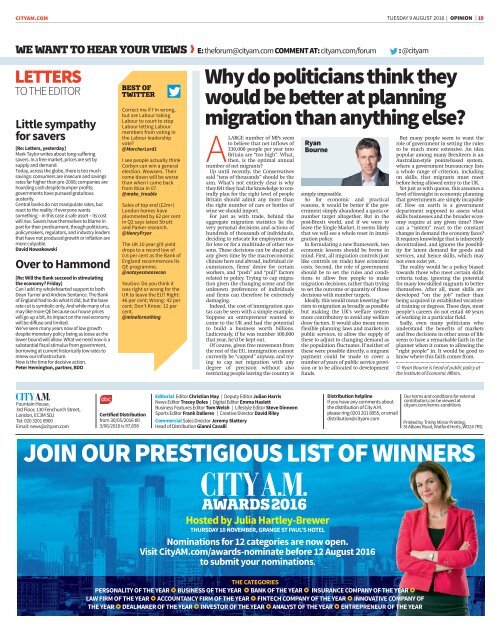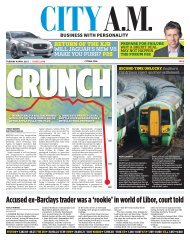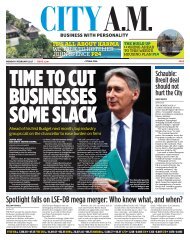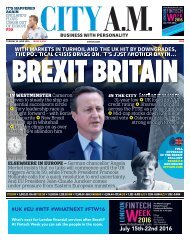You also want an ePaper? Increase the reach of your titles
YUMPU automatically turns print PDFs into web optimized ePapers that Google loves.
CITYAM.COM<br />
TUESDAY 9 AUGUST 2016<br />
OPINION<br />
19<br />
WE WANT TO HEAR YOUR VIEWS › E:theforum@cityam.com COMMENT AT:cityam.com/forum<br />
:@cityam<br />
LETTERS<br />
TO THE EDITOR<br />
Little sympathy<br />
for savers<br />
[Re: Letters, yesterday]<br />
Mark Taylor writes about long-suffering<br />
savers. In a free market, prices are set by<br />
supply and demand.<br />
Today, across the globe, there is too much<br />
savings: consumers are insecure and savings<br />
rates far higher than pre-2008; companies are<br />
hoarding cash despite bumper profits;<br />
governments have pursued gratuitous<br />
austerity.<br />
Central banks do not manipulate rates, but<br />
react to the reality: if everyone wants<br />
something – in this case a safe asset – its cost<br />
will rise. Savers have themselves to blame in<br />
part for their predicament, though politicians,<br />
policymakers, regulators, and industry leaders<br />
that have not produced growth or inflation are<br />
more culpable.<br />
David Nowakowski<br />
Over to Hammond<br />
[Re: Will the Bank succeed in stimulating<br />
the economy? Friday]<br />
Can I add my wholehearted support to both<br />
Dean Turner and Andrew Sentance. The Bank<br />
of England had to do what it did, but the base<br />
rate cut is symbolic only. And while many of us<br />
may like more QE because our house prices<br />
will go up a bit, its impact on the real economy<br />
will be diffuse and limited.<br />
We’ve seen many years now of low growth<br />
despite monetary policy being as loose as the<br />
lower bound will allow. What we need now is a<br />
substantial fiscal stimulus from government,<br />
borrowing at current historically low rates to<br />
renew our infrastructure.<br />
Now is the time for decisive action.<br />
Peter Hemington, partner, BDO<br />
BEST OF<br />
TWITTER<br />
Correct me if I’m wrong,<br />
but are Labour taking<br />
Labour to court to stop<br />
Labour letting Labour<br />
members from voting in<br />
the Labour leadership<br />
vote?<br />
@MarcherLord1<br />
I see people actually think<br />
Corbyn can win a general<br />
election. Wowsers. Their<br />
come down will be worse<br />
than when I came back<br />
from Ibiza in 07.<br />
@make_trouble<br />
Sales of top end (£2m+)<br />
London homes have<br />
plummeted by 62 per cent<br />
in Q2 says latest Strutt<br />
and Parker research.<br />
@HenryPryor<br />
The UK 10 year gilt yield<br />
drops to a record low of<br />
0.6 per cent as the Bank of<br />
England recommences its<br />
QE programme.<br />
@notayesmansecon<br />
YouGov: Do you think it<br />
was right or wrong for the<br />
UK to leave the EU? Right:<br />
46 per cent; Wrong: 42 per<br />
cent; Don’t Know: 12 per<br />
cent.<br />
@minefornothing<br />
Why do politicians think they<br />
would be better at planning<br />
migration than anything else?<br />
ALARGE number of MPs seem<br />
to believe that net inflows of<br />
330,000 people per year into<br />
Britain are “too high”. What,<br />
then, is the optimal annual<br />
number of net migrants?<br />
Up until recently, the Conservatives<br />
said “tens of thousands” should be the<br />
aim. What’s not entirely clear is why<br />
they felt they had the knowledge to centrally<br />
plan for the right level of people<br />
Britain should admit any more than<br />
the right number of cars or bottles of<br />
wine we should import.<br />
For just as with trade, behind the<br />
aggregate migration statistics lie the<br />
very personal decisions and actions of<br />
hundreds of thousands of individuals,<br />
deciding to relocate for employment or<br />
for love or for a multitude of other reasons.<br />
These decisions can be shaped at<br />
any given time by the macroeconomic<br />
climate here and abroad, individual circumstances,<br />
firms’ desire for certain<br />
workers, and “push” and “pull” factors<br />
related to policy. Trying to cap migration<br />
given the changing scene and the<br />
unknown preferences of individuals<br />
and firms can therefore be extremely<br />
damaging.<br />
Indeed, the cost of immigration quotas<br />
can be seen with a simple example.<br />
Suppose an entrepreneur wanted to<br />
come to the UK and had the potential<br />
to build a business worth billions.<br />
Ludicrously, if he was number 100,000<br />
that year, he’d be kept out.<br />
Of course, given free movement from<br />
the rest of the EU, immigration cannot<br />
currently be “capped” anyway, and trying<br />
to cap net migration with any<br />
degree of precision without also<br />
restricting people leaving the country is<br />
Ryan<br />
Bourne<br />
simply impossible.<br />
So for economic and practical<br />
reasons, it would be better if the government<br />
simply abandoned a quota or<br />
number target altogether. But in the<br />
post-Brexit world, and if we were to<br />
leave the Single Market, it seems likely<br />
that we will see a whole reset in immigration<br />
policy.<br />
In formulating a new framework, two<br />
economic lessons should be borne in<br />
mind. First, all migration controls (just<br />
like controls on trade) have economic<br />
costs. Second, the role of government<br />
should be to set the rules and conditions<br />
to allow free people to make<br />
migration decisions, rather than trying<br />
to set the outcome or quantity of those<br />
decisions with number targets.<br />
Ideally, this would mean lowering barriers<br />
to migration as broadly as possible<br />
but making the UK’s welfare system<br />
more contributory to avoid any welfare<br />
draw factors. It would also mean more<br />
flexible planning laws and markets in<br />
public services, to allow the supply of<br />
these to adjust to changing demand as<br />
the population fluctuates. If neither of<br />
these were possible directly, a migrant<br />
payment could be made to cover a<br />
number of years of public service provision<br />
or to be allocated to development<br />
funds.<br />
But many people seem to want the<br />
role of government in setting the rules<br />
to be much more extensive. An idea<br />
popular among many Brexiteers is an<br />
Australian-style points-based system,<br />
where a government bureaucracy lists<br />
a whole range of criterion, including<br />
on skills, that migrants must meet<br />
before being allowed entry to the UK.<br />
Yet just as with quotas, this assumes a<br />
level of foresight in economic planning<br />
that governments are simply incapable<br />
of. How on earth is a government<br />
department supposed to assess what<br />
skills businesses and the broader economy<br />
require at any given time? How<br />
can a “system” react to the constant<br />
changes in demand the economy faces?<br />
It requires knowledge that is inherently<br />
decentralised, and ignores the possibility<br />
for latent demand for goods and<br />
services, and hence skills, which may<br />
not even exist yet.<br />
The reality would be a policy biased<br />
towards those who meet certain skills<br />
criteria today, ignoring the potential<br />
for many low-skilled migrants to better<br />
themselves. After all, most skills are<br />
developed “on the job” rather than<br />
being acquired in established vocational<br />
training or degrees. These days, most<br />
people’s careers do not entail 40 years<br />
of working in a particular field.<br />
Sadly, even many politicians who<br />
understand the benefits of markets<br />
and free decisions in other areas of life<br />
seem to have a remarkable faith in the<br />
planner when it comes to allowing the<br />
“right people” in. It would be good to<br />
know where this faith comes from.<br />
£ Ryan Bourne is head of public policy at<br />
the Institute of Economic Affairs.<br />
Fountain House,<br />
3rd Floor, 130 Fenchurch Street,<br />
London, EC3M 5DJ<br />
Tel: 020 3201 8900<br />
Email: news@cityam.com<br />
Certified Distribution<br />
from 30/05/2016 till<br />
3/06/2016 is 97,658<br />
Editorial Editor Christian May | Deputy Editor Julian Harris<br />
News Editor Tracey Boles | Digital Editor Emma Haslett<br />
Business Features Editor Tom Welsh | Lifestyle Editor Steve Dinneen<br />
Sports Editor Frank Dalleres | Creative Director David Rile y<br />
Commercial Sales Director Jeremy Slattery<br />
Head of Distribution Gianni Cavalli<br />
Distribution helpline<br />
If you have any comments about<br />
the distribution of City A.M.<br />
please ring 0203 201 8955, or email<br />
distribution@cityam.com<br />
Our terms and conditions for external<br />
contributors can be viewed at<br />
cityam.com/terms-conditions<br />
Printed by Trinity Mirror Printing,<br />
St Albans Road, Watford Herts, WD24 7RG<br />
JOIN OUR PRESTIGIOUS LIST OF WINNERS<br />
Hosted by Julia Hartley-Brewer<br />
THURSDAY 10 NOVEMBER, GRANGE ST PAUL’S HOTEL<br />
Nominations for 12 categories are now open.<br />
Visit CityAM.com/awards-nominate before 12 August 2016<br />
to submit your nominations.<br />
THE CATEGORIES<br />
PERSONALITY OF THE YEAR £ BUSINESS OF THE YEAR £ BANK OF THE YEAR £ INSURANCE COMPANY OF THE YEAR £<br />
LAW FIRM OF THE YEAR £ ACCOUNTANCY FIRM OF THE YEAR £ FINTECH COMPANY OF THE YEAR £ INNOVATIVE COMPANY OF<br />
THE YEAR £ DEALMAKER OF THE YEAR £ INVESTOR OF THE YEAR £ ANALYST OF THE YEAR £ ENTREPRENEUR OF THE YEAR
















